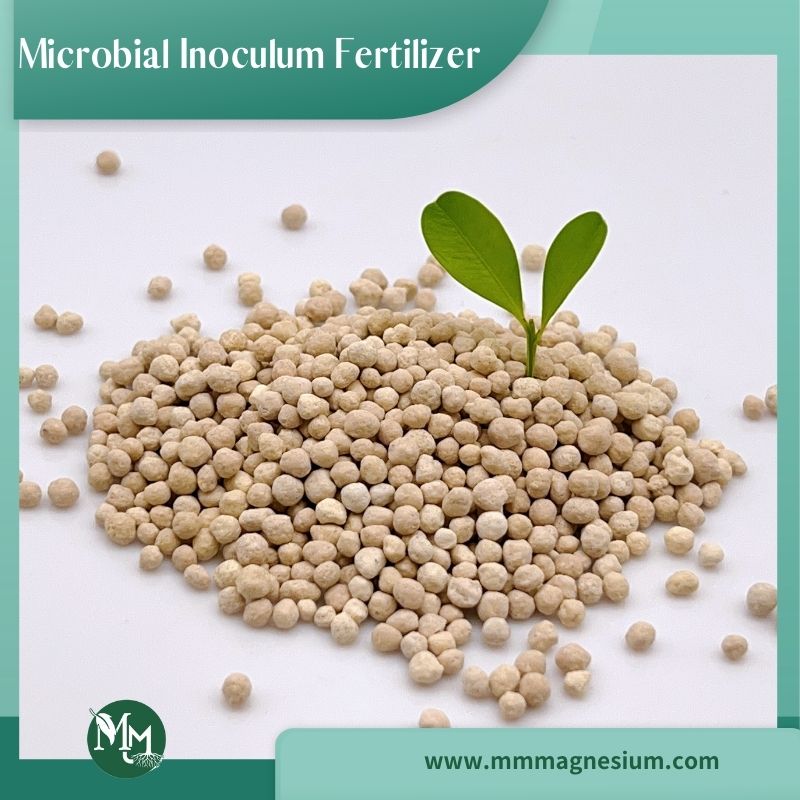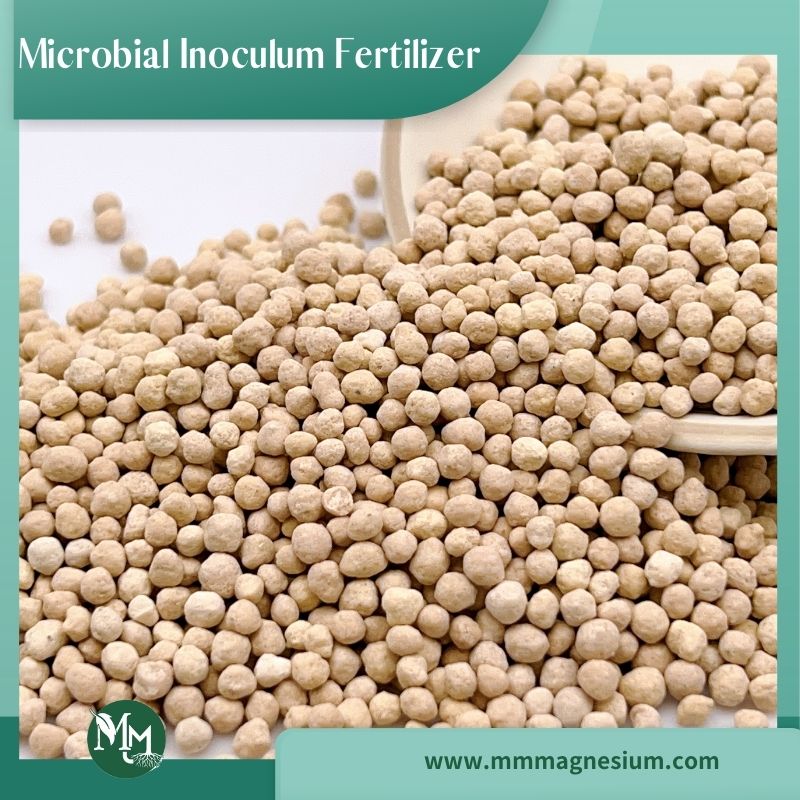

Effective live bacteria count ≥ 500 million/g
SiO2 ≥ 6%
CaO ≥ 3%
MgO ≥ 20%
Granular size: 2-4mm
Applicable crops: This product can be widely used in crops such as peanuts, rice, corn, cucumbers, various vegetables, fruit trees, melons and fruits, tea trees, flowers, grains, cotton and oil.




Yingkou Maomei Agricultural Technology Co., Ltd., relying on high-quality mineral resources, produces microbial inoculum fertilizer products with advanced technology and the following characteristics:
Products are exported to the United States, Russia, Indonesia, Canada, Spain, Malaysia, Bangladesh, and other countries, and also cover all provinces, cities, and regions across the country.
For more service advantages of Yingkou Maomei Agricultural Technology, please see Why choose us? and Factory Photos.
Advantages of Microbial Inoculum Fertilizer, Liaowo
1. High-efficiency active complex probiotics can strongly absorb and degrade pesticide residues in the soil, significantly reducing the damage caused by pesticide residues to crops in the current and next seasons.
2. Adjust acidity and salt, break soil hardening, and improve soil aggregate structure.
3. High-efficiency and active compound probiotics can slow and control the release of fertilizers, improve fertilizer utilization, and prevent crops from growing vigorously in the early stage and preventing fertilizer loss in the later stage.
4. High-efficiency active compound probiotics can effectively increase ground temperature, improve seed germination rate, and fertilize the soil to nourish roots.
5. High-efficiency and active compound probiotics are conducive to improving and cultivating the activity of beneficial microbial flora in farmland soil, forming dominant bacterial colonies around the roots, inhibiting the activities of harmful fungi, bacteria, and viruses, effectively reducing soil-borne pathogens, and improving crop disease resistance. , resistance to stress and repeated cropping.

Fertilization Recommendations
Depending on the soil conditions and crop types of the farmland, it can be applied as a base fertilizer, ditch fertilizer, hole fertilizer, or broadcast fertilizer. It can be mixed with chemical fertilizers for use. The recommended dosage is 10-20 kg/mu. For crops or fruit trees with higher yields, the dosage can be appropriately increased according to actual needs.

1. Protect from rain and sunlight, store in a ventilated and dry place, and do not transport or store together with toxic and hazardous substances.
2. Each bag is 25 kg, and we can also provide packaging as small as 1 kg or as large as ton bags according to customer requirements.
3. Plastic woven bags, lined with plastic inner bags. We provide all available packaging such as paper plastic bags/kraft paper bags/PE bags.
4. We provide a variety of transportation methods: road transportation, railway transportation, air transportation, container transportation, and ocean transportation.
5. Our company's marks can provide OEM or neutral marks.

FAQ
1.Do you provide fertilization plans?
We provide professional fertilization plans. Our team of agricultural experts will tailor a scientific and reasonable fertilization plan for you according to your crop type, soil conditions and growth stage to ensure that you get the best planting results.
2.What are the storage conditions for fertilizers?
We recommend storing fertilizers in a cool, dry, ventilated environment away from direct sunlight and moisture. At the same time, avoid contact with acidic and flammable substances to prevent chemical reactions or safety hazards. Correct storage conditions help maintain the quality and stability of fertilizers.

Product Knowledge:Application cases of silicon calcium magnesium microbial fertilizer on different crops

Silicon calcium magnesium microbial fertilizer mainly contains the following ingredients:
Silicon (Si): Improves plant resistance to pests and diseases, enhances photosynthesis efficiency, promotes stem toughness, and reduces the risk of lodging.
Calcium (Ca): Promotes cell wall formation, improves soil structure, and improves plant stress resistance.
Magnesium (Mg): Participates in the synthesis of chlorophyll, improves photosynthesis efficiency, and enhances the absorption of nutrients by crops.
Beneficial microorganisms: such as Bacillus subtilis, phosphate-solubilizing bacteria, etc., improve the soil microbial environment, promote nutrient transformation, and improve soil fertility.
1. Application case on rice. The experimental location is a rice growing area in southern China. The experimental design is: control group (no fertilizer), low-dose group (5 kg/ha), and high-dose group (10 kg/ha). The experimental results are as follows:
Yield improvement: The low-dose group and the high-dose group increased by 12% and 18% respectively compared with the control group.
Disease resistance: The incidence of rice blast is reduced by 20%.
Soil improvement: the organic matter content increases by 15%, and the pH value becomes neutral.
Case study: Silicon-calcium-magnesium microbial fertilizer can significantly improve the rice growth environment, increase yield and disease resistance by providing necessary medium and trace elements and beneficial microorganisms.
2. Application case on corn. The experimental location is the corn growing area in the Midwestern United States. Experimental design: control group and treatment group (fertilization 10 kg/ha). The experimental results are as follows:
Yield improvement: The treatment group increased by 14% compared with the control group.
Photosynthesis efficiency: chlorophyll content increased by 22%.
Drought resistance: Survival rate increased by 25% under drought conditions.
Case study: Silicon-calcium-magnesium microbial fertilizer can significantly improve corn yield and quality by enhancing photosynthesis efficiency and stress resistance, especially under drought conditions.
3. Application case on wheat. The experimental location is a wheat growing area in Australia. Experimental design: A control group and a treatment group (fertilizer 8 kg/ha) are set up in iron-deficient soil. The experimental results are as follows:
Yield improvement: The treatment group increased by 20% compared with the control group.
Chlorophyll content: increased by 18%.
Soil improvement: physical and chemical properties are improved, and the aggregate structure is enhanced.
Case study: Silicon-calcium-magnesium microbial fertilizer improves wheat nutrition and growth environment by supplementing medium and trace elements, significantly increasing yield and disease resistance, and is especially suitable for poor soil.
4. Application case on soybeans. The experimental location is the soybean growing area in Brazil. Experimental design: control group and treatment group (fertilization 6 kg/ha). The experimental results are as follows:
Yield improvement: The treatment group increased by 16% compared with the control group.
Rhizobium activity: increased by 25%.
Disease resistance: Reduce the incidence of powdery mildew by 30%.
Case study: Silicon-calcium-magnesium microbial fertilizer has important economic and ecological benefits by promoting the activity of rhizobia, enhancing nitrogen fixation ability and disease resistance, and improving soybean yield and quality.
5. Application case on apple trees. The experimental location is an apple orchard in Shandong Province, China. Experimental design: control group and treatment group (fertilization 12 kg/ha). The experimental results are as follows:
Yield improvement: The treatment group increased by 15% compared with the control group.
Fruit quality: hardness and sugar content increased by 10% and 8% respectively.
Disease suppression: The incidence of mildew is reduced by 18%.
Case study: Silicon-calcium-magnesium microbial fertilizer can significantly increase apple tree yield and fruit quality by improving the soil environment and enhancing disease resistance, helping to improve fruit quality and market competitiveness.
Yingkou Maomei Agricultural Technology Co., Ltd
Name: Brenda
Mobile:86-188-7490-2028
Tel:86-400-699-8826
Whatsapp:86-18874902028
Email:info@maomeimg.com
Add:Qianjia Village, Nanlou Economic Development Zone, Yingkou City, Liaoning Province, China